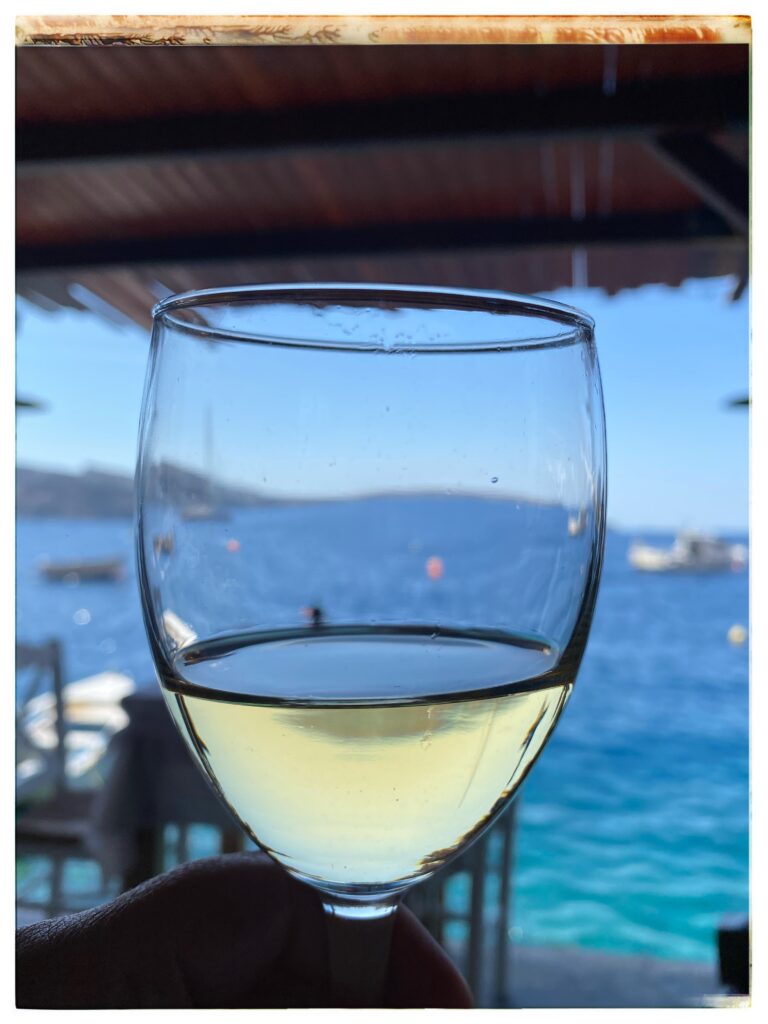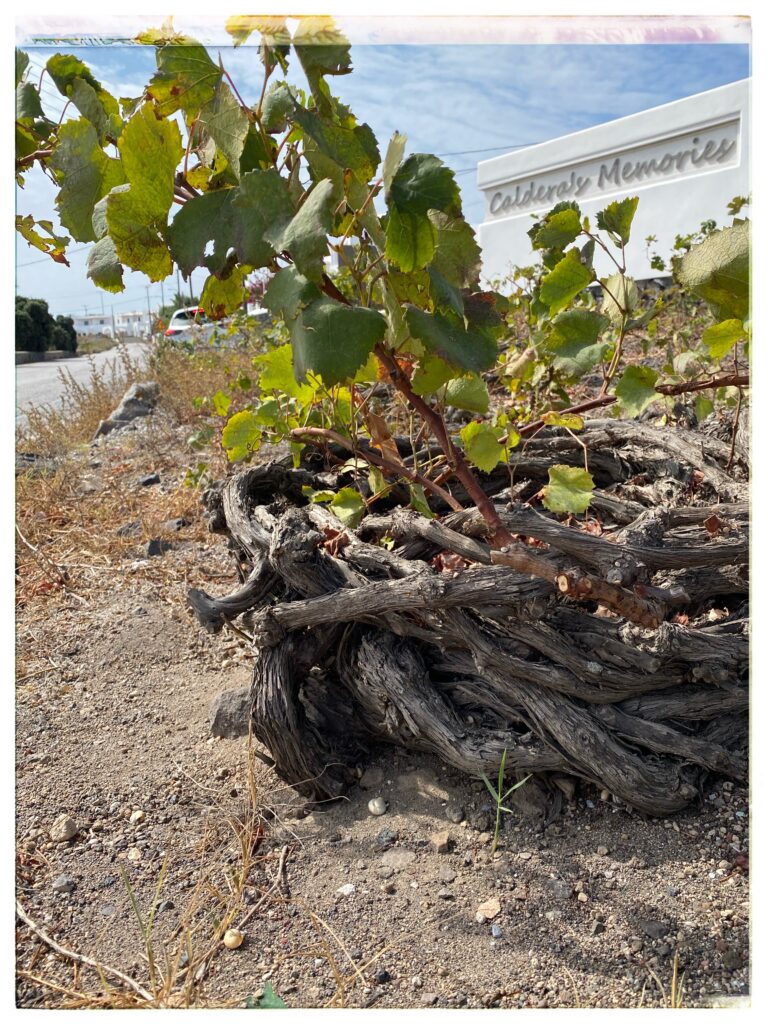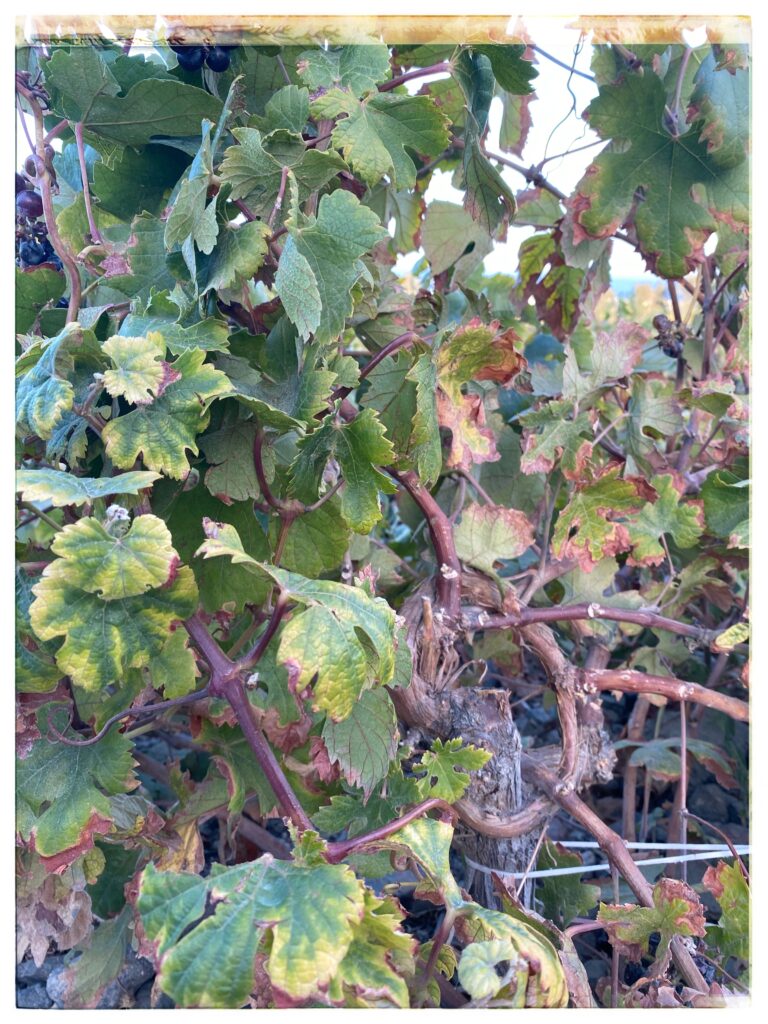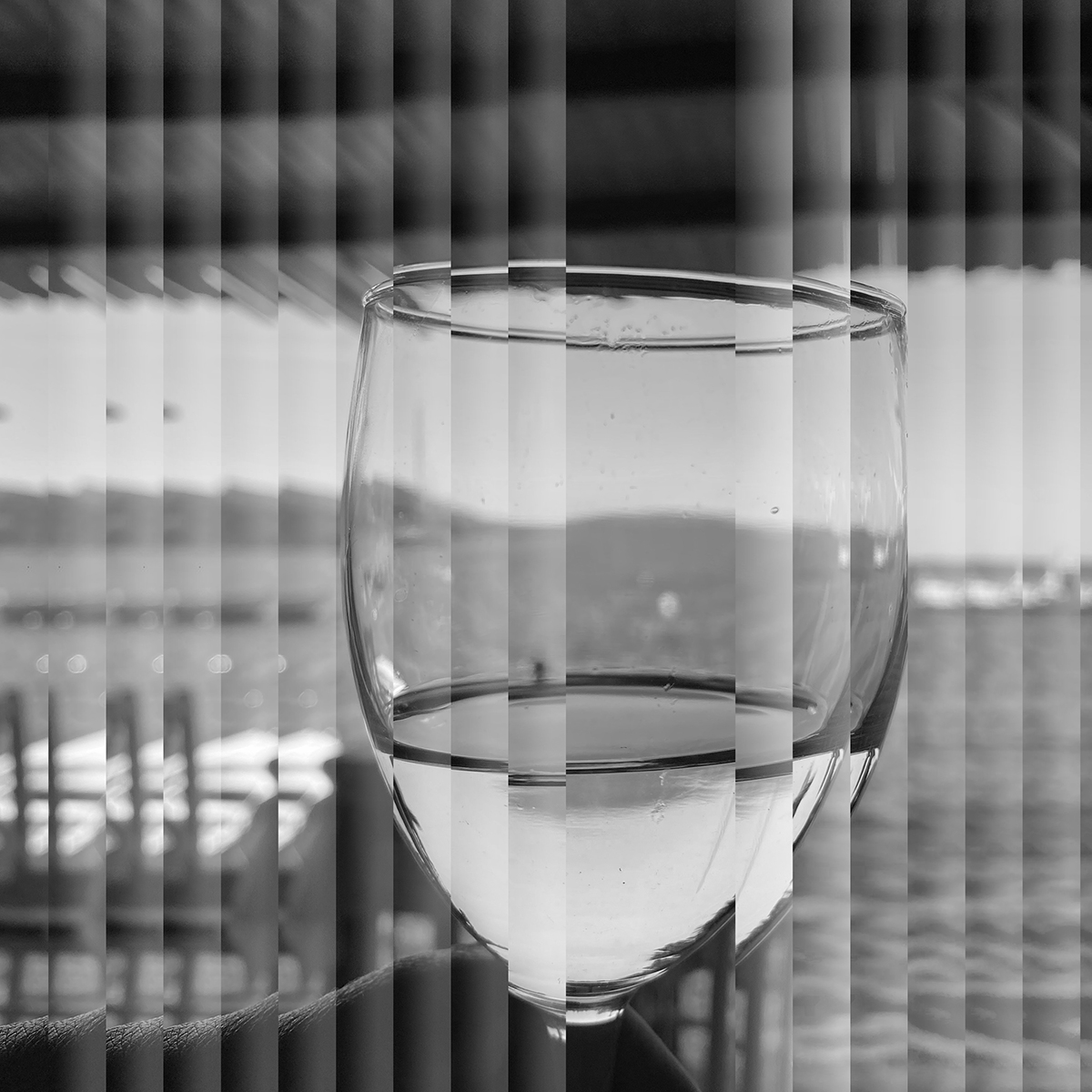Collected memories of vineyard tours, taste notes and sample pours: coastal sea breeze salinity, smoky volcanic rock minerality and lemon-lime-kiwi acidity.
“What are you in the mood for?” I somewhat instantly regret wasting a question as I already know what the husband is going to order. “Fish” is the correct and only answer. And some house white wine please!

When it comes to white wine, and indeed cider, I am a sucker for salinity! This gorgeous salty aftertaste that just instantly evokes the sea and all its sounds. It’s like Morcheeba’s The Seai in liquid form – it soothes, oh lawd, it soothes! But it has to be balanced, who likes salty drinks amirite? I like my drinks kissed by the sea breeze. Whether I’m sipping on a Scottish cider, a coastal English gin or a Greek white wine, if the salinity is right, I’m game. Lucky for me, Santorini’s whites offer such desirous experiences perfectly.
Being a fairly small island located in the Aegean Sea, it takes roughly 45mins to drive from one end to the other, this croissant shaped rock is ideally suited for growing grapes, due to its Mediterranean climate, think mild winters and warm, dry summers.
Ok, fair enough, who are we kidding, Greece has been growing grapes and making wine since people started to drink and think, so of course Santorini is grape growing territory.
The star of the show here is Assyrtiko – and yes it is a fun saying it out loud as it looks! Go ahead, try it! Ah-seer-tee-ko! What a fun word!
Anyway, Assyrtiko is a native white grape of Santorini and takes up roughly 75% of all the islands vineyard real estate, with the other two grapes, Athiri and Aidani, completing the white wine setii.
And no wonder, Assyrtiko is the main grape – it happily grows in the hot, dry and windy conditions of Santorini, while holding on to its high crisp and clean acidity like its life depends on it. The resulting wine pairs perfectly with creamy, salty cheeses, light and simple citrussy seafood dishes, fried fish, and light pasta dishes.
Assyrtiko ages also rather well in barrels, and its bright kiwi-lime acidity gives way to sumptuous yellow stone fruit characters reminding of ripe juicy peach.
We visited Santorini just after the end of this year’s harvest, so the vines still look pretty awesome, albeit without grapes: green lush leaves popping against the grey-white pumice soil. The harvest here starts and ends about a month earlier than other European growing regions, in case you were wondering, so the vines stay looking like this for a while too.
Santorini’s grapes have to endure rather harsh conditions during their lives, with the hot Greek sun and the strong winds beating down on them relentlessly, often sandblasting the fruit with fine ash, lava and pumice particles – courtesy of the dormant, yet still active volcano that is Santorini.
So if you’re a supporter of terroir, you know you’ll find it here – smoky, dusty rock minerality, sea breeze salinity and piercing citrus acidity all rolled into a sumptuous easy drinking white wine.
Wines, red and white, grown in volcanic soils are often celebrated, due to the attributes the soils adds to the liquids, ranging from minerality and flintiness, to earthy and smoky flavours and a sharp acidity which enables longevity, but whether or not you wish to call this terroir is your prerogative indeed.
The white wine arrives along with a plate of tzatziki and fried pita. The cool cucumber crunches against the warm salty crispness of the bread and oozes refreshment against the heat from the garlic. My German heart sings when I discover the dill, while the husband sighs: “I don’t like dill. Surely there shouldn’t be any dill in this.”. I pour some wine from the small glass carafe into two even smaller tumblers and take a long sip from mine, almost emptying the glass – “Perfect”.
A couple of days earlier, we found ourselves in a wine cellar sipping last year’s vintage. “You should get some notes of lime and lemon” our sommelier tells us. We sniff, swirls, sniff and sip our way through the wines, and it feels right: we are surrounded by bottles and old oak barrels, cardboard boxes and new shiny oak barrels too, and the glasses we hold are sommelier-style wine glasses, with ultra fine rims and perfectly designed bowls for swirling. A flick of the wrist, and the wine’s aroma changes. We were told about the harvest, the processes involved in the creation of the wines, and what to perhaps expect in the flavours. We have toured the winery and vineyard and end up in the tasting room, enjoying a glass of their Pet Nat. Live is sweet if your wine is sparkling!
Our salads arrive and the house white pairs perfectly with the tuna carpaccio, the feta cheese and the ripe tomatoes. “More wine?”- “Yes please!”

Have you ever seen a kouloura? If you’re lucky enough, you might spot a one by the roadside. I say that, because even though this is the most common used vine training system in Santorini’s viticulture, the vineyards we drove past were either younger vines and not yet woven into those beautiful baskets, or they were trained using a system called kladeftiko – the more modern bush training system.
Here the vines grow taller and resemble a bush rather than a ground hugging basket, with young shoots being tied around the branches, forming small bracelets hanging vertically above the ground, offering more aeration for the grapes. This method however doesn’t protect the flowers and resulting berries from the almost non-stop wind, so older vineyards and those less protected from wind will grow grapes using the basket method – kouloura.
Vine bracelets and vine baskets, have you lost it? Nope au contraire: due to the unforgiving weather, vines are trained to grow low to the ground in consecutive circles, with the berries being placed on the inside of the growing basket. The kouloura system has helped vines for eons by protecting the young precious grapes from the sunshine, wind, sand, and dust, as well as trapping moisture overnight, which in turn helps the plants grow.
“What do you fancy for dinner?” I ask the husband absentmindedly while turning the page of my book. Oops, I did it again. “Fish” is the correct and only answer. And some house white please!
“[…]The inhabitants of Santorini have been growing grapes since… […] here you can see a wine press … […]” I press the little recorder to my left ear, listening intently. We’re below ground in a cave which has been repurposed as a wine museum. Suddenly the air is filled with a sweet dried fruit smell, recalling dark chocolate, warm fig pudding, raisins. Smooth oak notes and caramelised sugar. Some cinnamon. The source of the smell becomes clear once I turn around the next corner: five gigantic wooden barrels slowly oozing aging Vinsanto. The chalk date states 1999. Should this cave spontaneously collapse, I’d be fine with this. Just smelling this desert wine is enough to know it doesn’t get much better then this.
This time, our wine arrives in a metal carafe, which looks like it would feel more at home on an antique fire engine then a restaurant table. The glasses resemble large, muscular shot glasses.

“Oh, that’s me. She calls me the bucket!” The four of us laugh loudly while he drains the perfectly designed wine glass. Our tour guide appears visibly confused. “So, what do you think?” the guide asks, “any favourites?”
We’re still giggling, perhaps due to the subtle intoxication the 9th sample of wine has induced. We’ve joined a wine tour around the island, visiting 3 wineries, and we’re just about to depart the second one.
The husband and I were clear: no booze cruise!, so he spent hours carefully comparing tours and ended up selecting the one we find ourselves on, alongside “the bucket”. So far, we’ve enjoyed some light traditional nibbles, incl. cheeses, dried fruit and nuts with a flight of 4 wines in the first winery’s shaded garden. We indulged in another 5, including an intoxicating Vinsanto at the second wineries open air tasting room, paired with traditional cheeses and breads.
“I actually really liked the third one!” – “Really, that’s interesting” – “I liked the ….” There are many other groups around us, filling the large benches, sipping, chatting, taking notes. Some have been to the same first winery we have been too. It begins to feel slightly too commercial for my liking. This is by no means a booze cruise, we can all still converse without slurring, we walk straight and some have joined me in using the provided spittoons, yet I feel a little like a paid ticket, rather than a potential future customer. Granted, if I wanted to learn more about the wineries, I should have visited them individually. Spend time with the vines, the people who make, sell and drink the wines. Ask questions and listen to answers. This was not the goal of this: We are here to try some wine, enjoy a couple of hours away from the sun lounger and explore. This is just fun – it’s only five of us, and we seem to get along nicely. At each winery we’re poured a sample of their signature wines in bright crystal glasses. It is serving big wine tasting vibes, with easily accessible enjoyment. We learn a lot because we don’t have to.
“What do you fancy for dinner later? I’m hungry. You hungry?” I manage to say between gulps of air, whilst trying to breathlessly climbing the seemingly steepest rough looking lava ridge in the blistering sun. I can hear and feel the white pumice crunch under my feet, making it seem like I’m almost hovering. We’re trying to reach the tiny white church with the bright blue roof the husband has been observing through his monocular all week from the comforts of his deckchair. “Fish” is the correct and only answer. And some house white please!
The wind carries the crashing sound of the waves for miles. It’s so dark we can’t see the ocean a few meters away from us, but we can hear it. And we can smell it. Morcheeba plays softly in my head.
The wine arrives in a small earthenware jug, glazed halfway in a turquoise dream. The accompanying glasses are not much bigger than shot glasses. The water glasses look like giants next to them. I pour some wine into the thimble sized vessels. We toast, we drink, we ponder, we order some more. Life is sweet if you drink Greek wine!
Γειά μας!
Yamas!
xxx

Leave a Reply